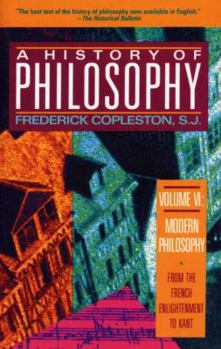History of Philosophy, Vol. 6: From the French Enlightenment to Kant (Modern Philosophy)
(Book #6 in the A History of Philosophy Series)
Select Format
Select Condition 
Book Overview
Conceived originally as a serious presentation of the development of philosophy for Catholic seminary students, Frederick Copleston's nine-volume A History Of Philosophy has journeyed far beyond the modest purpose of its author to universal acclaim as the best history of philosophy in English. Copleston, an Oxford Jesuit of immense erudition who once tangled with A.J. Ayer in a fabled debate about the exiatenceof God and the possibility of metaphysics,...
Format:Paperback
Language:English
ISBN:0385470436
ISBN13:9780385470438
Release Date:December 1993
Publisher:Image
Length:528 Pages
Weight:1.15 lbs.
Dimensions:8.2" x 1.1" x 5.4"
Customer Reviews
5 ratings
Volume 4: The Birth of the Modern
Published by Thriftbooks.com User , 15 years ago
Volume I of this series covers the pre-Christian philosophies of Greece and Rome, while Volumes II and III are devoted to Medieval and Scholastic philosophers. (I have, for the moment, jumped over those last two). Volumes IV, V, and VI cover "modern" philosophy from Descartes through Kant, and this volume (Volume IV) has a special treat at the beginning. There is a fascinating, well-written introduction which is actually an introduction to Volumes IV, V, and VI --- and is therefore a brilliant 62-page essay on everything from Descartes to Kant. Naturally, it's a bird's-eye overview, but it is the first thing I have ever read which actually made me feel I understood Kant! (When in college, I made a serious blunder and just went and bought "The Critique of Pure Reason" and sat down and tried to read it! :-) 30 pages later, I abandoned my foolish task with a bad headache!) Volume IV covers Descartes, Pascal, Spinoza, and Leibniz. As usual, the discussion and illustrations are excellent.
Kant get enough
Published by Thriftbooks.com User , 16 years ago
The two main players in this volume is Rosseau and Kant, whose mentality is about as different as one can fing in the field of philosophy. Rosseau has his idealistic notion of The Noble Savage, The Social Contract, amongst other things that one can clearly see is more how he wished the world was than how it actually operated. His ideas are so blatantly wrong even given the knowledge of the times it makes one wonder why he gets so much prominence. It does make for an interesting psychological study of how a social misfit tries to justify being inept for common society. Kant is where one finds some real meat to chew on, whether or not you agree with him. There's no doubt he created a revolution in Philosophy, but the question remains.... is he right? Is time and space an a priori construct that allows humanity to experience phenomena. Is substance an a priori construct to discern objects from one another? His argumentation for some is solid, like his ideas on substance, which has been largely substantiated through neuroscience. The notions of time and space are much more difficult, and his ideas on these are much more debatable. The main issue is his severance of the phenomenal world of he experience with the noumenal world which is not directly experienced. He never really sufficiently links the thing-in-itself with the object as experience, which later philosophers jumped on rather rapidly. His moral theory while claiming to be completely on reason, is really mostly emotive(as Copleston rightly states), essentially saying that do an action only if you would think it justified for another to do the same. Hence, it's wrong to lie because you wouldn't wanyt everybody to lie. While okay, it's not a good enough foundation to really make a solid base. His views on aesthetics and art are fascinating, and surprisingly the most interesting of what he wrote. Copleston bares his teeth a little more than usual with Kant, which took this reader a little bit by surprise. Now, Copleston was a Thomist, and Kant essentially tried to destroy metaphysics as it was understood by the ancients, so it's understandable. Mostly Copleston attacked Kant because of the philosophers after Kant who took his Critique to its logical conclusion, with ridiculous results. Needless to say, a mindblowing read, and his best since Volume 3.
The Best Introduction to Philosophy Ever!
Published by Thriftbooks.com User , 18 years ago
Copleston's series, "The History of Philosophy", is quite possibly the best introduction to the history of philosophical thought that has ever been published and certainly the best currently in print. You will be hard pressed to find a better collection of solid philosophical surveys in one place. The beauty of the series is that Copleston has clearly done his research on each period and each thinker of Western philosophy. I cannot recommend this series any more highly. It is a must-have collection for anyone who is a scholar (professional or casual) of philosophy, theology or any of the arts. If this isn't on your bookshelf, it should be!
Good intro to Kant
Published by Thriftbooks.com User , 19 years ago
More than 200 pages of Copleston's Vol. 6 is devoted to the notoriously difficult writings of Immanuel Kant, in effect a book within the book. You will find there a detailed explication of what Kant wrote, what he was trying to accomplish, and why. The discussion is both scholarly and very readable.
Great
Published by Thriftbooks.com User , 25 years ago
This series is great. I have been reading the series over the past 3 years at irregular intervals. I am over halfway finished. It has been one of the most rewarding things I've ever done.





